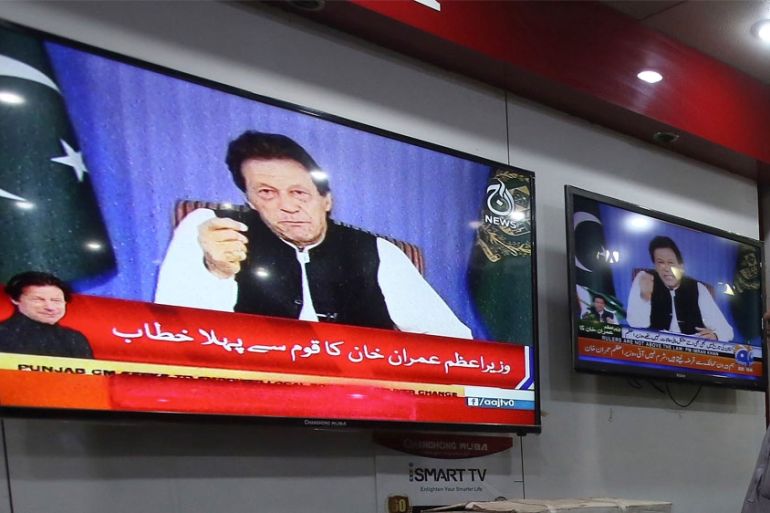Imran Khan vows to cut government expenses, tackle corruption
In his first televised speech, new leader pledges to lower government spending and maintain peace with neighbours.

Islamabad, Pakistan – Imran Khan pledged to massively cut government costs and crack down on corruption in his first televised address to the nation a day after being sworn in as Pakistan’s prime minister.
Khan’s Pakistan Tehreek-e-Insaf (PTI) party swept last month’s general election late last month, mandating him with the task of leading a country faced with a slew of challenges, including on the economic front.
Keep reading
list of 4 itemsA year since Pakistan’s May 9 riots: A timeline of political upheaval
Pakistan says it blocked social media platform X over ‘national security’
Pakistan court suspends Imran Khan’s prison sentence in state gifts case
In his wide-ranging speech on Sunday from the capital, Islamabad, Khan vowed to cut down on government expenditure in a bid to control a ballooning fiscal deficit, while inviting the country’s millions of overseas citizens to invest back home to help shore up dwindling foreign reserves.
“In Pakistan’s history, we have never been as big an economic crisis as we are in today,” he said, promising to run the country as an “Islamic welfare state”, on the principles espoused by Islam’s Prophet Muhammad when he established the state of Medina in the 7th century.
“We are an indebted nation with no money, no money to spend on our children, on our poor people, on our farmers, we cannot give clean drinking water to our people,” he said. “On the hand, there is another path.”
The cricketer-turned-politician promised to auction off the fleet of more than 80 vehicles maintained by the prime minister’s office, keeping only two for his official use.
He also said he would fire the majority of the 524 staff who work at the prime minister’s official residence, promising to set an example of simplicity for all government leaders and employees.
“If we have to save ourselves from this destruction, we have to change our thinking, we have to change our behaviour … and the most important thing is that we will have to create compassion in our hearts,” he said.
In his hour-long speech, Khan also spoke of the need to maintain peace with Pakistan’s neighbours, the challenges of climate change and the need for civil service reform. He also outlined how he would revamp the country’s education and health sectors.
Khan spoke favourably of progressive taxation and social welfare systems in the Scandinavian countries, saying Pakistan should follow their example.
“Today the state of our people, their animals are better off,” he said.
Election allegations
After winning 151 seats in the 342-member parliament in the July 25 polls, Khan’s PTI has since put together a coalition government with several smaller parties, pushing the outgoing Pakistan Muslim League-Nawaz (PML-N) and Pakistan People’s Party (PPP) into opposition.
Between them, the PML-N, the PPP and the country’s powerful military have ruled Pakistan for more than four decades. Khan’s PTI campaigned on a reform agenda, promising to remove government inefficiency, wipe out endemic corruption and revitalise government service delivery.
His election victory, however, has been marred by allegations from the PML-N, PPP and others of widespread irregularities during the vote counting process for the election.
They have also accused the military of having tilted the playing field in Khan’s favour in the run-up to the polls, by restricting news media coverage of his opponents, and pressuring the judiciary to pursue corruption cases against his rivals.
The military and judiciary deny the allegations. The Committee to Protect Journalists (CPJ), Reporters Without Borders (RSF) and other rights groups, however, have documented widespread censorship of the press in the run-up to the election.
On Saturday, Khan was sworn in as the country’s 22nd prime minister in a simple ceremony in Islamabad. Later that day, he unveiled a 20-member cabinet, comprising 15 ministers and five advisors.
Pakistan’s external debt stands at $70.2bn, or 26.6 percent of Gross Domestic Product, with foreign reserves down to $10.1bn, according to central bank data.
The country is expected to approach external institutions to help stave off a balance of payments crisis, with the International Monetary Fund (IMF) and bilateral loans among options being discussed.
On Sunday, Khan railed against the need for approaching external lenders, as he has often done in his 22-year political career.
“Any country that wants to progress, it has to stand on its own feet,” he said. “The way we have been going for so long, we cannot continue like this … those who give you a loan, you lose your freedom, you lose your honour.”
Reporting by Asad Hashim, Al Jazeera’s digital correspondent in Pakistan. He tweets @AsadHashim